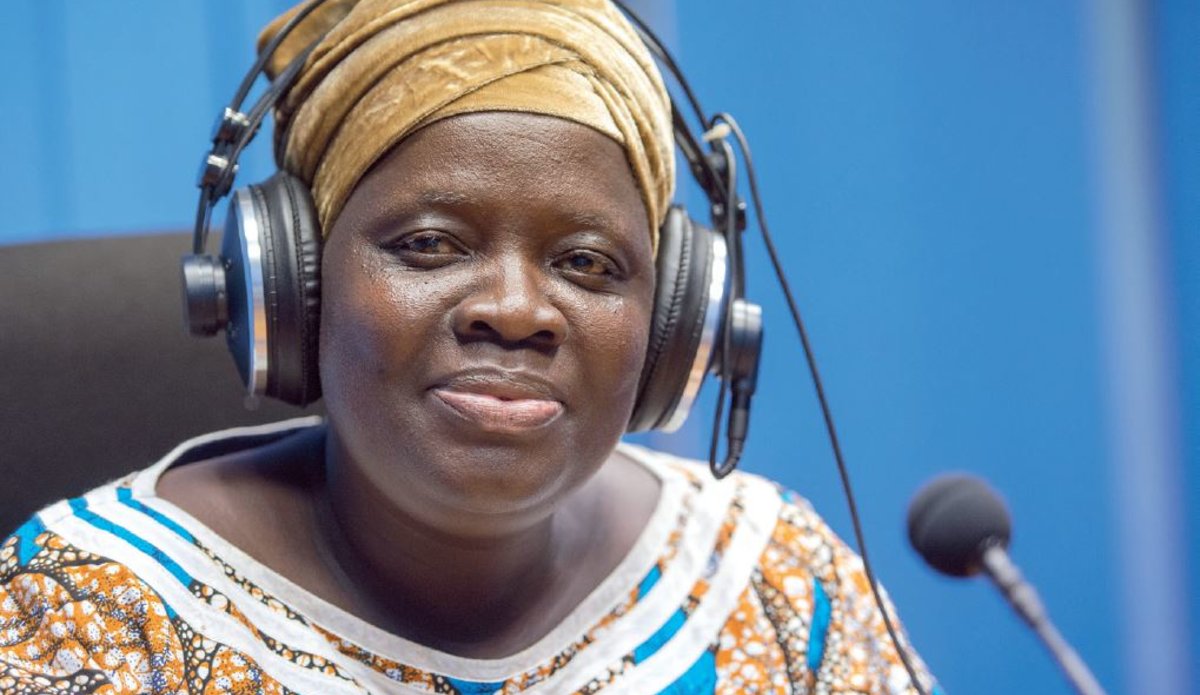The story of UNMIL [Book]: Eva Flomo, a passion for reporting on peace
Now one of the most respected household voices in Liberia, UNMIL Radio producer, Eva Flomo had a hint of her destiny when in school she would grab a scroll of paper pretending it was a microphone.
But Ms. Flomo went on to study economics and English in university, until she met someone who suggested that her passionate speaking style would be of better use in media. If she chose journalism, a friend warned: “You’ll be broke for life.”
During her first years at the Liberian state broadcaster, her job was to carry gear for the journalists, all men. One day the team simply disappeared, leaving behind notes for a story. “I was like...Are you kidding me? I was scared like hell.” After two hours, she realized a deadline had to be met and put together a story on the Liberian peace process, that aired and won her promotion to producer.
Her early broadcast career was in Central Liberia, then under the control of Charles Taylor. “It could have been crazy,” she says now.
But she learned that “under pressure, I could be at my very best.”
She began covering women’s issues. “We live in a patriarchal society where only a man’s voice matters. It’s still that way today. Only in the urban enclave do you have feminism, emancipation, equality.”
There was a lot of work to do: laws on the books gave women certain rights they were either unaware of or could not access. Women are to inherit one-third of a couples’ property upon a husband’s death, for example, but “since women are property, there is no way a property can own a property,” Ms. Flomo said. The Women’s Lawyers Association of Liberia ran a campaign on the law, and Ms. Flomo became the public voice behind that and many other stories on social issues.
She was hired by UNMIL Radio as the Mission deployed in 2003 and is now one of fifteen staff remaining as the Mission prepares to transition ownership of the station to ECOWAS.
She believes UNMIL contributed to the media landscape in Liberia by bringing credibility to the profession of journalism. Poverty means that few journalists can resist a manager’s instruction to “hurl insults” or favour friends, she said. UNMIL journalists were paid at an unprecedented level for Liberian media. That caused some resentment, but it also guaranteed their professionalism.
“I want to sound as a critical voice in my country, a voice people can believe, creating an environment of possibility. That’s the distinction of UNMIL Radio. Most journalists have to solicit money for a story. I have to ensure my story is right and balanced and has all the elements a news story requires," she says.
The coverage won a large audience, and surveys returned comments such as “if it comes from Radio UNMIL, you can trust it.”
Ms. Flomo recalls travelling to a tense region with the first Force Commander when they were confronted with young men brandishing guns. As the UN Commander stood them down, Ms. Flomo asked herself, “What on earth am I doing here? This was amazing, and crazy. Because anything could have gone awry.”
“This job does so much public good, but it’s also dangerous. It’s not just about you, as a media person: it’s about society. As a journalist, you are contributing to the peace process. I came back and wrote that story, and it dawned on me, I’m in this for keeps.”
 UN
UN United Nations Peacekeeping
United Nations Peacekeeping

![The story of UNMIL [Book]: UNMIL Radio: keeping Liberians informed The story of UNMIL [Book]: UNMIL Radio: keeping Liberians informed](https://unmil.unmissions.org/sites/default/files/styles/gallery_image_thumb/public/field/image/radio_studio.jpg?itok=ov7LUVOU)



